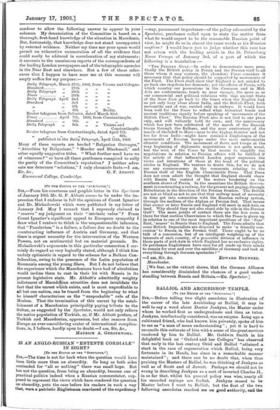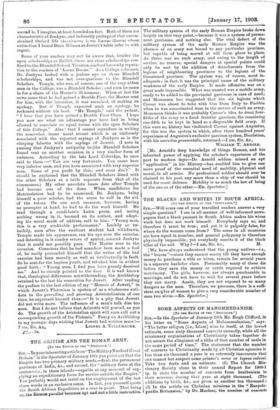BALLIOL AND ARCHBISHOP TEMPLE.
(To THE EDITOR OP THE "SPECTATOR.1 SIR,—Before telling two slight anecdotes in illustration of the career of the late Archbishop at Balliol, it may be well to say a word about Doctor Jenkyns, the Master under whom he worked first as undergraduate and then as tutor. Jenkyns, intellectually considered, was an enigma. Long ago a cultivated friend, who had known him privately, spoke of him to me as "a man of mean understanding" ; yet it is hard to reconcile this estimate of him with a sense of the great services rendered by him to Balliol. Mr. Goldwin Smith in his delightful book on "Oxford and her Colleges" has observed that early in the last century Oriel and Balliol "attained a start in the race of regeneration which Balliol, being very fortunate in its Heads, has since in a remarkable manner maintained" ; and there can be no doubt that, when thus praising the Masters of Balliol, be was thinking of Jenkyns as well as of Scott and of Jowett. Perhaps we should not be wrong in describing Jenkyns as a sort of inverted Charles IL, in so far that, whilst his general policy was wise, nearly all his recorded sayings are foolish. Jenkyns oeased to be Master before I went to Balliol; but the first of the two following anecdotes reached me on good authority, and the second is, I imagine, at least founded on fact. Both of them are characteristic of Jenkyns, and indirectly perhaps of that uncon- strained Oxford life (Zeym.iraz.ro; i; rip iiiarras if,oucria) whose extinction I heard Dean Milman at Jowett's table refer to with regret.
Some of your readers may not be aware that, besides the open scholarships at Balliol, there are close scholarships con- fined to the Blundell School, Tiverton, a school known by reputa- tion to the readers of "Lorna Doone." As a College reformer, Dr. Jenkyns looked with a jealous eye on those Blundell scholarships, and was not over-gracious to the Blundell Scholars. Temple, who was, of course, one of the very ablest men in the College, was a Blundell Scholar; and even he came in for a share of the Master's ill-humour. When at last the news came that he had gained a Double First, the Master sent for him, with the intention, it was surmised, of making an
apology. But if Temple expected such an apology, he
reckoned without his host. "Mr. Temple," said the pedant, "I hear that you have gained a Double First Class. I hope
you now see what an advantage you have had in being allowed to associate on equal terms with the open Scholars of this College." Alas ! that I cannot reproduce in writing the somewhat inane nasal accent which is as uniformly associated with the reported sayings of Jenkyns as is the chirping falsetto with the sayings of Jowett. (I note in passing that Jenkyns's antipathy tolthe Blundell Scholars found vent on another occasion in a very similar form of rudeness. According to the late Lord Coleridge, he once said to them :—" You are very fortunate. You came here very inferior men, and you have associated with very superior men. Some of you profit by this ; and some don't." It should be explained that the Blundell Scholars dined with the other Scholars at a table separate from that of the commoners.) My other anecdote bears date after Temple had become one of the dons. When candidates for Matriculation bad to be examined, Dr. Jenkyns, being himself a poor scholar, had the sense to call in the aid of the tutors. On one such occasion, however, having no prompter at hand, he had to do the work himself. He read through a candidate's Latin prose, and seeing nothing wrong in it, beamed on its author, and adopt- ing his usual mode of address, said to him : 'Young man, this is a very creditable performance." Luckily or un- luckily, soon after the exultant student had withdrawn, Temple made his appearance, ran his eye over the exercise, and detecting in it sundry errors of syntax, assured Jenkyns that it could not possibly pass. The Master rose to the occasion. Conscious that he had somehow been made a fool of, he easily persuaded himself that the writer of the bad exercise had been morally as well as intellectually in fault. So he sent for the hapless youth, and rebuked him in evident good faith : "Young man, I find you have grossly deceived me." And he sternly pointed to the door. It is well known that, theological differences notwithstanding, the Archbishop retained to the last his veneration for Jowett. After reading the preface to the last edition of my "Memoir of Jowett," in which Jowett's Platonism is spoken of as a wholesome anti- dote to the prevailing and growing Aristotelianism of our time, he expressed himself thus:—" It is a pity that Jowett did not write more. The influence of a man's talk dies too soon. But I do not believe that Aristotle will prevail, as you do. The growth of the Aristotelian spirit will soon call out a corresponding growth of the Platonic." Fancy an Archbishop in my younger days wishing that Jowett bad written more !-











































 Previous page
Previous page